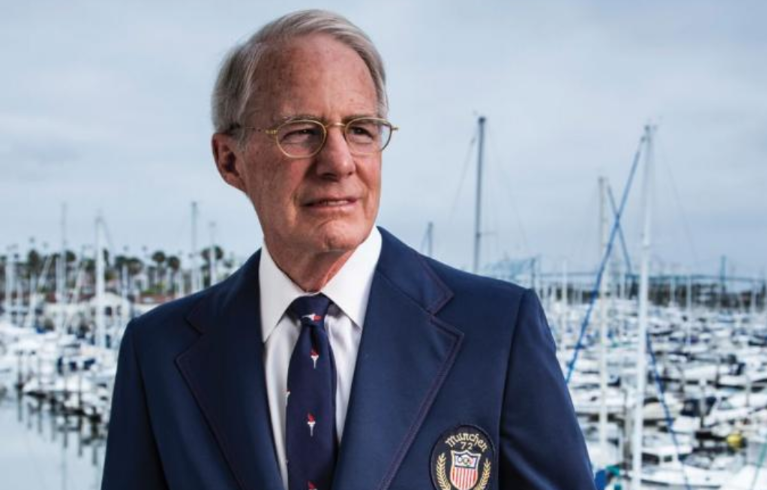

Mike Schoettle maintained his relationship with the U.S. Olympic Committee, and by the end of the 1980s, had held a number of leadership positions within sailing, including team leader of the U.S. Olympic yachting team in 1992.
Lawrenceville’s Summer Olympians: Michael Schoettle, Class of 1954
Mike Schoettle is the only Lawrenceville Olympian who had yet to graduate from the School when he competed. The 15-year-old still had two more years of school after winning the gold in men’s sailing as part of the 5.5 meter class aboard the Complex II in the 1952 Helsinki Games.
Mike Schoettle stands alone among his fellow Lawrenceville Olympians as the only one who had yet to graduate from the School when he competed. In fact, the 15-year-old still had two more years of school after winning the gold in men’s sailing as part of the 5.5 meter class aboard the Complex II in the 1952 Helsinki Games. Contrary to what you might expect, however, Schoettle undertook his Olympic experience with hardly any fanfare.
“I’m just not that way. I didn’t show off or talk about it. I just left and came back, so I didn’t feel like a celebrity,” he recalls. “They had an article about it in the school paper, but no one else said much about it, and I didn’t either.”
In fact, according to The Lawrence of September 24, 1952, Sandy Gideonse ’52 was the Lawrentian most expected to compete that summer, but he did not qualify for the Olympic team. The story noted how “[n]obody noticed at the year’s end that Mike Schoettle was preparing his passport to Helsinki.”
Schoettle was raised on Philadelphia’s Main Line, but spent his summers on the waters of the Jersey Shore in Mantoloking and Bay Head, where he crewed for Dr. Britton Chance of the University of Pennsylvania.
“I sailed with him for three years, when I was 12, 13, and 14, and then he decided to sail in the Olympics. So we applied and were accepted. There was no Olympic trials, so we just went,” Schoettle says. Just like that, Chance, along with Sumner and Edgar White – twin brothers who had just graduated from Harvard – and Schoettle took off for Sweden in early June.
“I was 15, and sailed almost every day for nearly two months. We sailed our boat from Stockholm to Helsinki,” he says. “The Olympics required someone to become the alternate, so that was me. There were seven races and I raced in one race, the next-to-last race, and we won. We also won the last race, so we got a gold medal.”
Schoettle adds that while the records indicate that he earned a gold medal, he never actually received one. “In later Olympics, they gave medals to the alternates who competed, but back then, they didn’t. But I nevertheless crewed on the gold medal-winning 5.5 meter. It was really a great experience for a young man.”
If there was one hitch in his Olympic encounter, Schoettle says it’s that he missed the Olympic parade. “My father didn’t want to spend the money to buy me the uniform, so I didn’t march in it,” recalls Schoettle, who was an alternate on the 1972 team with his brother, Ferdinand.
Schoettle maintained his relationship with the U.S. Olympic Committee, and by the end of the 1980s, had held a number of leadership positions within sailing, including team leader of the U.S. Olympic yachting team in 1992.
A version of this story appeared in the summer 2016 issue of The Lawrentian.
